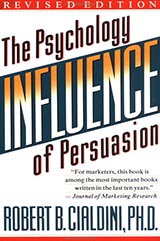My Notes on “Influence – The Psychology of Persuasion” by Robert Cialdini:
The Rule of Reciprocation
- Eg Krishnas giving flower away and then expecting a donation (and even retrieving the flowers from the trash)
- Free samples leave us feeling in debt.
- Amway leaves several free samples for a couple of days for the customer to use if they wish.
- Gifts such as free personalised address labels with a request for a donation.
- The rule can trigger unfair exchanges – a drink in a bar for sex
- Reciprocal Concessions:
- Request for something big which is refused, followed by a request for something small which is accepted eg Boy Scout selling circus tickets, and then chocolate bars
- Rejection then Retreat:
- Asking for more than you want so when you ask for what you want it seems easy to say yes too. Eg comedy script writers put swear word in first, and then retreated to a borderline word instead that would have been rejected without the technique
- Larger-then-smaller request:
- Works better then advertising a low priced item and then attempting to upsell
Commitment and Consistency
- Eg After placing a bet, the punter is more confident of their horse winning
- Get people to verbally agree (eg to look after my towel at the beach), and they will protect it with their lives!
- The comforts of mindless consistency
- eg I believe Transcendental Meditation will help me with my insomnia so I better hurry up and pay for the course before I change my mind
- Toy companies advertise a certain toy but limit the stock in the shop so parents by an alternative and come back later to buy the toy because they made a promise to their children
- When asked if they will vote for this year, saying yes means they will turn up (but ask them who they will vote for and the might name the popular choice but in private choose someone else)
- Foot-in-the-door:
- Start with small request, escalate to a bigger request.
- Can be used to manipulate a persons self image eg turn citizens into public servants, prospects into customers, prisoners into collaborators. Once you have their self image where you want it they will comply with a whole range of requests that are consistent with their view of themselves.
- Eg “can we put up this little sign on your lawn?” And 2 weeks later, from a different organisation (both community services), “can we put up this huge billboard?”
- Chinese prisoners of war asked captives to accept that USA is not perfect, and to write essays about why it isn’t
- The power of written statements
- Write down goals
- Getting the customer to fill out the purchase agreement themselves
- Offering a prize draw for people who submit testimonials – convinces them they love the product even more and fosters loyalty
- When made public are even more important to the author – eg smoker tells everyone they know that they are quitting
- Going to extra effort :
- Eg initiation ceremonies for fraternities, in Amazon tribes and in the Chinese prisons – all get the people to own what they do.
- Instead of telling a child the rules “don’t touch the toy or there will be consequences!” (short term compliance), get them to own the decision “don’t touch the toy” – the kids thought to themselves “I don’t want to play with it”
- Lowball:
- Getting commitment to a low price and then pilling on the extra costs incrementally. The technique has the ability to make people pleased with a poor choice
Social Proof
- Canned laughter makes crap TV seem funnier
- Cults get started and grow with social proof. Gets people isolated so they have nothing else in their lives “I better believe in this whole heartedly because I don’t have anything else”
- Bystander inaction:
- If no one else is panicking or acting, there is no emergency. “There are 30 other people watching this attack in the street, one of them surely has already called the cops”
- We take more notice if the people involved are similar to ourselves
- Use of on-the-street testimonials about products
- Curing a child’s phobia of dogs by watching 2 hours of kids playing with dogs, or a fear of the water by video of kids having fun swimming
- Large number of suicides after front page story of suicide
Liking
- Why Tupperware parties work so well – people are obliged to help out people they like
- Physical attractiveness sells (eg politicians, sexy models on cars)
- Similarity
- Compliments – flattery works
- Contact and Cooperation:
- Get kids of different races together into team to work towards a common goal (rather than just dump them all in the same class where it is easy to segregate)
- Jigsaw Learning is where every kid gets a piece of the puzzle and has to share their part so the whole team can win
- Good cop / bad cop
- Conditioning and Association:
- Weathermen are held responsible for bad weather
- The bearer of bad news in ancient times often gets killed
- Pavlov’s dog
- Sports fanatic brawls after losing game
Authority
- People will obey a person in uniform. Eg:
- An actor who plays a doctor recommending a product
- An actor with a clipboard telling a volunteer to electrocute another actor
- By being charmingly truthful about a few issues disarms eg the waiter who said “that’s not a good choice tonight, try this, its delicious and cheaper!” and then later “may I choose the desserts and wine for you?” when they wouldn’t have chosen such expensive ones themselves
Scarcity
- Deadlines
- Limited stock, rare items, limited edition
- Competition from other consumers
- eg inviting all prospective car buyers at the same time
- Psychological Reactance:
- Losing freedoms we already have eg the terrible twos or teenage years (telling daughter not to hang out with a dork moves her closer to him)
- Banning cigarettes would cause a thriving black market
- Scarcity of information: Banned information seems more valuable.
- Eg telling a jury to disregard information will actually make that information more important to their decision!
